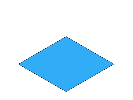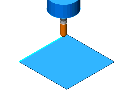Stepover
Introduction
This topic will explain the stepover, describe where to access it, explain its parameters, and provide animated examples.
Stepover
The stepover is the distance between two adjacent toolpath cuts. The distance can be defined as Maximum Stepover, or Cusp Height. When you change either value, the system automatically calculates the other value.
Navigation
To access the Stepover in the Mill Multiaxis Wizard:
- In the Stepover group, of the Surface Paths tab, enter a value next to Maximum stepover.
Parameters
- Maximum
Stepover - is the maximum allowable distance between cuts.
- Cusp height - is the cusp height, when using ball end mills, that controls the stepover.
Note: The stepover
is a possible maximum value. So it can be smaller than the defined value
but never larger.
Note: Using a cusp height only works with ball end mills.
Important: The step over is measured differently with
each pattern used:
► Parallel
Cuts - the distance between two adjacent slices.
► Cuts
Along Curves - the distance along the curve perpendicular
to which the cutting planes are used.
► Morph
Between 2 Curves/Surfaces - the toolpath segments are distributed
so that the maximum distance (along the drive surface) between
the curves/surfaces is a user defined value.
► Parallel
to Curve/Surfaces - this is the 3D distance between two
consecutive toolpath segments.
► Projected
Curve - only one cut is performed, so this parameter is
not available.
Example
-
Parallel Cuts with a small step over.
-
The same example with a larger step over.








